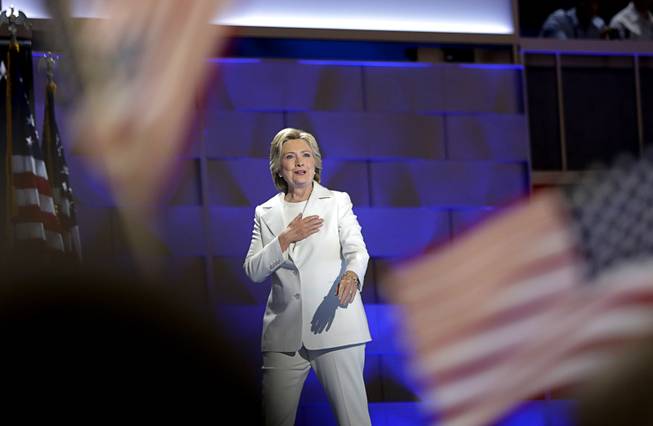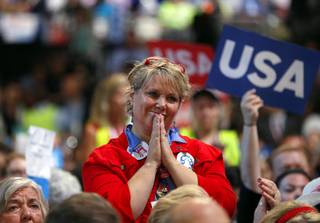
Matt Rourke / AP
Democratic presidential nominee Hillary Clinton appears during the final day of the Democratic National Convention in Philadelphia, Thursday, July 28, 2016.
Published Thursday, July 28, 2016 | 9:40 p.m.
Updated Thursday, July 28, 2016 | 10:15 p.m.
PHILADELPHIA — Hillary Clinton hearkened back to the founding of the nation, here in the city of its birth, to show what compromise and togetherness amid uncertain times can bring, in a speech Thursday night officially accepting the Democratic presidential nomination.
Her message to the convention body at the Wells Fargo Arena on the final day of a national party convention marked by disunity was we don’t have to all be the same, but we must come together and compromise for a common goal, the betterment of the nation and its citizens, regardless of your political party, how much money you make, or ultimately who you vote for.
“Our Founders embraced the enduring truth that we are stronger together,” she said.
“Stronger together” was the refrain. She spoke of the country’s founding, how divided the colonies were at that time, some wanting to stay with England and others wanting to be separate.
“The revolution hung in the balance,” she said. “Then somehow they began listening to each other, compromising, finding common purpose. And by the time they left Philadelphia, they had begun to see themselves as one nation.”
It was a message that sought to find a middle ground with those who disagree with Clinton, progressives and moderates alike. She explained how she wanted to carry everyone's stories to the White House, those of Democrats, Republicans and independents alike.
Even still, protesters booed and attempted to start chants during the speech, which were quickly drowned out by chants of “Hillary” from the crowd.
Vermont Sen. Bernie Sanders' most vocal supporters wore neon yellow T-shirts that said “enough is enough,” including several members of Nevada’s delegation. Delegation members also held up signs that said “Jill Stein” in green, in reference to the Green Party’s presidential candidate.
Clinton attempted to extend an olive brach to those supporters in her speech. She thanked Sanders, saying that his campaign inspired millions of Americans and how he had brought economic and social justice issues to the forefront of the discussion.
To his supporters, Clinton said she wanted them to know that she has indeed heard them. “Your cause is our cause. Our country needs your ideas, energy and passion,” Clinton said. “That’s the only way we can turn our progressive platform into real change for America."
She noted the historicity of her own nomination — the first woman to be nominated the presidential candidate by a major political party.
“Standing here as my mother’s daughter, my daughter’s mother, I’m so happy this day has come,” she said.
Clinton acknowledged the “powerful forces” threatening to tear the country apart, not least of all Republican presidential candidate Donald Trump. Trump painted in his acceptance speech last week a dim portrait of America — as Clinton called it in her address “midnight in America” — and himself as its Messiah, a portrait that Clinton said is aimed at dividing Americans and making people fearful of one another and the future.
She quoted President Franklin Delano Roosevelt in rebuttal: “The only thing we have to fear is fear itself.” She said that the country has to be “clear-eyed” about what it faces, but that its people cannot be afraid and that it most definitely is not weak.
Focusing on the positives, Clinton praised the country for being diverse and tolerant, for having a strong military, for encouraging innovation, and for its commitment to “enduring values,” like freedom, equality, justice and opportunity.
“We should be so proud that these words are associated with us,” Clinton said. “That when people hear them, they hear America."
She pushed back on Trump’s proposal to build a wall at the U.S.-Mexico border or place a ban on members of a certain religion. Instead, she said, the country will build a strong economy, create a path to citizenship for unauthorized immigrants, and fight terrorism abroad.
She criticized him for his past business dealings and for stressing the importance of “America first” but manufacturing goods with his name on them overseas.
And where Trump said that “he alone” would fix the country, Clinton said that the country would do it together.
“Two hundred and forty years later, we still put our faith in each other,” Clinton said.
She told the crowd her personal story — how her father was a small-business owner and how her mother had been abandoned as a child but was “saved by the kindness of others.”
The lesson they taught her, she said, was “no one gets through life alone.”
She talked about working for the Children’s Defense Fund to help children with disabilities as an example of how to accomplish big ideas. “You do it step-by-step, year-by-year, and sometimes even door-by-door,” she said.
On the economy, Clinton said that Democrats have long been the party of the working people but haven’t done enough to show it. She promised to create jobs across the country with good wages, invest in infrastructure, and work with Sanders to create tuition-free college for the middle class and debt-free college for everyone.
She said that those reforms would be funded by “Wall Street, corporations and the super-rich … paying their fair share."
Touting her foreign policy experience, she said that a leader should understand the benefits of working with allies across the globe while keeping the nation safe.
She also cast doubt on whether Trump had the right personality to be president. “Imagine him in the Oval Office facing a real crisis,” Clinton said. “A man you can bait with a tweet is not a man we can trust with nuclear weapons."
She even went out of her way to praise Republican Sen. John McCain, who ran for president in 2008, as a “hero and a patriot who deserves our respect.” Trump said last summer that McCain was “not a war hero.”
She talked about the importance of appointing the right Supreme Court justices, combatting climate change, and passing comprehensive immigration reform. Other issues she touched on ranged from gun control to defending equal rights, to standing up to “divisive rhetoric."
She also called generally for anyone who shares in these ideals to join her campaign, regardless of their political preference.
Clinton said that when the country builds “a better tomorrow for our beloved children and our beloved country” then “America will be greater than ever."


Join the Discussion:
Check this out for a full explanation of our conversion to the LiveFyre commenting system and instructions on how to sign up for an account.
Full comments policy